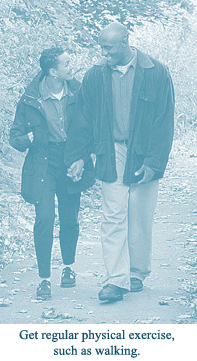Grief/Bereavement
Grief is a deep sadness or sorrow that results from a loss. The loss can
be from something big or small. It can be from something positive or
negative. Examples of things that cause grief include changes in:
There are many factors that shape our response to a loss such as death. These include:
Each of these factors can add to or reduce the pain of grieving. Trying to deny or avoid grief only seems to create more serious problems later. To come through the process in a healthy way, it is best to understand what coping with loss is all about. |
 |
Stages of Grief
Before a griever can feel “whole” or healed, they generally go through four stages:
- Shock. The person feels dazed or numb.
- Denial and Searching. The person:
- Is in a state of disbelief
- Asks questions, such as “Why did this happen?,” “Why didn’t I prevent this?”
- Looks for ways to keep their loved one or loss with them
- Thinks he or she sees or hears the deceased person
- Just begins to feel the reality of the event
- Suffering and Disorganization. The person:
- Has feelings, such as guilt, depression, anxiety, loneliness, fear, hostility
- May place blame on everyone and everything, including themself
- May get physical symptoms, such as headaches, stomachaches, constant fatigue, shortness of breath
- Withdraws from routine and social contacts
- Recovery and Acceptance. The person:
- Begins to look at the future instead of focusing on the past
- Adjusts to the reality of the loss
- Develops new relationships
- Develops a positive attitude
The normal period of grieving the loss of a loved one lasts from one to three years, but could take longer.
Questions to Ask
Have you just attempted suicide, are you making plans for suicide, or do you have repeated thoughts of suicide or death? |
 |
|
|
|
Are you abusing medication and/or alcohol to make yourself feel better? Do you need these to cope or “numb” your pain? |
 |
|
|
|
|
 |
|
|
|
Have you refused to sort through the deceased’s belongings after a significant time? |
 |
|
|
|
|
|
Self-Help
|
 |
What You Can Do for a Friend or Relative
|
 |
